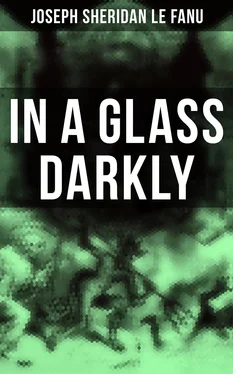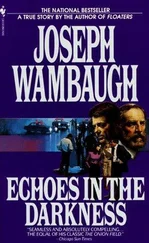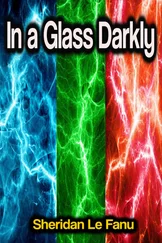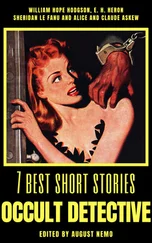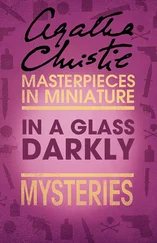Notwithstanding all this confidence, only two days later I had this note, dated from his house off Piccadilly:
DEAR SIR — I have returned disappointed. If I should feel at all able to see you, I shall write to ask you kindly to call. At present, I am too low, and, in fact, simply unable to say all I wish to say. Pray don’t mention my name to my friends. I can see no one. By-and-by, please God, you shall hear from me. I mean to take a run into Shropshire, where some of my people are. God bless you! May we, on my return, meet more happily than I can now write.
About a week after this I saw Lady Mary at her own house, the last person, she said, left in town, and just on the wing for Brighton, for the London season was quite over. She told me that she had heard from Mr. Jenning’s niece, Martha, in Shropshire. There was nothing to be gathered from her letter, more than that he was low and nervous. In those words, of which healthy people think so lightly, what a world of suffering is sometimes hidden!
Nearly five weeks had passed without any further news of Mr. Jennings. At the end of that time I received a note from him. He wrote:
“I have been in the country, and have had change of air, change of scene, change of faces, change of everything — and in everything — but myself. I have made up my mind, so far as the most irresolute creature on earth can do it, to tell my case fully to you. If your engagements will permit, pray come to me to-day, to-morrow, or the next day; but, pray defer as little as possible. You know not how much I need help. I have a quiet house at Richmond, where I now am. Perhaps you can manage to come to dinner, or to luncheon, or even to tea. You shall have no trouble in finding me out. The servant at Blank Street, who takes this note, will have a carriage at your door at any hour you please; and I am always to be found. You will say that I ought not to be alone. I have tried everything. Come and see.”
I called up the servant, and decided on going out the same evening, which accordingly I did.
He would have been much better in a lodging-house, or hotel, I thought, as I drove up through a short double row of sombre elms to a very old-fashioned brick house, darkened by the foliage of these trees, which overtopped, and nearly surrounded it. It was a perverse choice, for nothing could be imagined more triste and silent. The house, I found, belonged to him. He had stayed for a day or two in town, and, finding it for some cause insupportable, had come out here, probably because being furnished and his own, he was relieved of the thought and delay of selection, by coming here.
The sun had already set, and the red reflected light of the western sky illuminated the scene with the peculiar effect with which we are all familiar. The hall seemed very dark, but, getting to the back drawing-room, whose windows command the west, I was again in the same dusky light. I sat down, looking out upon the richly-wooded landscape that glowed in the grand and melancholy light which was every moment fading. The corners of the room were already dark; all was growing dim, and the gloom was insensibly toning my mind, already prepared for what was sinister. I was waiting alone for his arrival, which soon took place. The door communicating with the front room opened, and the tall figure of Mr. Jennings, faintly seen in the ruddy twilight, came, with quiet stealthy steps, into the room.
We shook hands, and, taking a chair to the window, where there was still light enough to enable us to see each other’s faces, he sat down beside me, and, placing his hand upon my arm, with scarcely a word of preface began his narrative.
Chapter VI.
How Mr. Jennings Met His Companion
Table of Contents
The faint glow of the west, the pomp of the then lonely woods of Richmond, were before us, behind and about us the darkening room, and on the stony face of the sufferer for the character of his face, though still gentle and sweet, was changed rested that dim, odd glow which seems to descend and produce, where it touches, lights, sudden though faint, which are lost, almost without gradation, in darkness. The silence, too, was utter: not a distant wheel, or bark, or whistle from without; and within, the depressing stillness of an invalid bachelor’s house.
I guessed well the nature, though not even vaguely the particulars, of the revelations I was about to receive, from that fixed face of suffering that so oddly flushed stood out, like a portrait of Schalken’s, before its background of darkness.
“It began,” he said, “on the 15th of October, three years and eleven weeks ago, and two days — I keep very accurate count, for every day is torment. If I leave anywhere a chasm in my narrative tell me.
“About four years ago I began a work, which had cost me very much thought and reading. It was upon the religious metaphysics of the ancients.”
“I know,” said I, “the actual religion of educated and thinking paganism, quite apart from symbolic worship? A wide and very interesting field.”
“Yes, but not good for the mind — the Christian mind, I mean. Paganism is all bound together in essential unity, and, with evil sympathy, their religion involves their art, and both their manners, and the subject is a degrading fascination and the Nemesis sure. God forgive me!
“I wrote a great deal; I wrote late at night. I was always thinking on the subject, walking about, wherever I was, everywhere. It thoroughly infected me. You are to remember that all the material ideas connected with it were more or less of the beautiful, the subject itself delightfully interesting, and I, then, without a care.”
He sighed heavily.
“I believe, that everyone who sets about writing in earnest does his work, as a friend of mine phrased it, on something — tea, or coffee, or tobacco. I suppose there is a material waste that must be hourly supplied in such occupations, or that we should grow too abstracted, and the mind, as it were, pass out of the body, unless it were reminded often enough of the connection by actual sensation. At all events, I felt the want, and I supplied it. Tea was my companion-at first the ordinary black tea, made in the usual way, not too strong: but I drank a good deal, and increased its strength as I went on. I never experienced an uncomfortable symptom from it. I began to take a little green tea. I found the effect pleasanter, it cleared and intensified the power of thought so, I had come to take it frequently, but not stronger than one might take it for pleasure. I wrote a great deal out here, it was so quiet, and in this room. I used to sit up very late, and it became a habit with me to sip my tea — green tea — every now and then as my work proceeded. I had a little kettle on my table, that swung over a lamp, and made tea two or three times between eleven o’clock and two or three in the morning, my hours of going to bed. I used to go into town every day. I was not a monk, and, although I spent an hour or two in a library, hunting up authorities and looking out lights upon my theme, I was in no morbid state as far as I can judge. I met my friends pretty much as usual and enjoyed their society, and, on the whole, existence had never been, I think, so pleasant before.
“I had met with a man who had some odd old books, German editions in mediæval Latin, and I was only too happy to be permitted access to them. This obliging person’s books were in the City, a very out-of-the-way part of it. I had rather out-stayed my intended hour, and, on coming out, seeing no cab near, I was tempted to get into the omnibus which used to drive past this house. It was darker than this by the time the ‘bus had reached an old house, you may have remarked, with four poplars at each side of the door, and there the last passenger but myself got out. We drove along rather faster. It was twilight now. I leaned back in my corner next the door ruminating pleasantly.
Читать дальше
